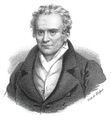Template:Selected anniversaries/July 28: Difference between revisions
No edit summary |
No edit summary |
||
| Line 10: | Line 10: | ||
||John Gough (d. 28 July 1825) was a blind English natural and experimental philosopher who is known for his own investigations as well as the influence he had on both John Dalton and William Whewell. | ||John Gough (d. 28 July 1825) was a blind English natural and experimental philosopher who is known for his own investigations as well as the influence he had on both John Dalton and William Whewell. | ||
||1866: Metric system approved in the U.S. The first Act of Congress legalizing the employment of the metric system was approved (14 Stat. L. 339). The act provided that it "shall be lawful throughout the United States of America to employ the weights and measures of the metric system." | |||
||Jan Evangelista Purkyně (d. 28 July 1869) was a Czech anatomist and physiologist. In 1839, he coined the term 'protoplasm' for the fluid substance of a cell. He was one of the best known scientists of his time. Pic. | ||Jan Evangelista Purkyně (d. 28 July 1869) was a Czech anatomist and physiologist. In 1839, he coined the term 'protoplasm' for the fluid substance of a cell. He was one of the best known scientists of his time. Pic. | ||
| Line 18: | Line 20: | ||
||John Torrence Tate Sr. (b. July 28, 1889) was an American physicist noted for his editorship of Physical Review between 1926 and 1950. He is the father of mathematician John Torrence Tate Jr. | ||John Torrence Tate Sr. (b. July 28, 1889) was an American physicist noted for his editorship of Physical Review between 1926 and 1950. He is the father of mathematician John Torrence Tate Jr. | ||
File:Georg Cantor 1894.png|link=Georg Cantor (nonfiction)|1899: [[Georg Cantor (nonfiction)|Georg Cantor]] asked [[Richard Dedekind (nonfiction)|Richard Dedekind]] whether the set of all cardinal numbers is itself a set, because, if it is, it would have a cardinal number larger than any other cardinal. | |||
File:Karl Popper.jpg|link=Karl Popper (nonfiction)|1902: Philosopher and academic [[Karl Popper (nonfiction)|Karl Popper]] born. He will be known for his rejection of the classical inductivist views on the scientific method, in favor of empirical falsification: A theory in the empirical sciences can never be proven, but it can be falsified, meaning that it can and should be scrutinized by decisive experiments. | File:Karl Popper.jpg|link=Karl Popper (nonfiction)|1902: Philosopher and academic [[Karl Popper (nonfiction)|Karl Popper]] born. He will be known for his rejection of the classical inductivist views on the scientific method, in favor of empirical falsification: A theory in the empirical sciences can never be proven, but it can be falsified, meaning that it can and should be scrutinized by decisive experiments. | ||
Revision as of 07:54, 11 August 2018
1619: Johannes Kepler writes to Napier expressing his enthusiasm for Napier's invention of logarithms.
1818: Mathematician and engineer Gaspard Monge dies. He invented descriptive geometry, and did pioneering work in differential geometry.
1899: Georg Cantor asked Richard Dedekind whether the set of all cardinal numbers is itself a set, because, if it is, it would have a cardinal number larger than any other cardinal.
1902: Philosopher and academic Karl Popper born. He will be known for his rejection of the classical inductivist views on the scientific method, in favor of empirical falsification: A theory in the empirical sciences can never be proven, but it can be falsified, meaning that it can and should be scrutinized by decisive experiments.
1932: U.S. President Herbert Hoover orders the United States Army to forcibly evict the Bonus Army.
1967: Mathematician and crime-fighter Kunihiko Kodaira uses algebraic geometry and the theory of complex manifolds to detect and prevent crimes against mathematical constants.
1968: Chemist and academic Otto Hahn dies. He pioneered the fields of radioactivity and radiochemistry, winning the Nobel Prize in Chemistry in 1944 for the discovery and the radiochemical proof of nuclear fission.
1974: Watergate scandal: The House of Representatives Judiciary Committee votes 27 to 11 to recommend the first article of impeachment (for obstruction of justice) against President Richard Nixon.
1974: Industrialist, public motivational speaker, and alleged crime boss Baron Zersetzung says he "advised President Nixon to have one of the House Judiciary Committee members murdered, as a lesson to the others."








